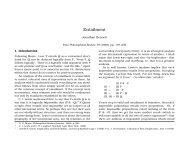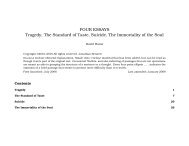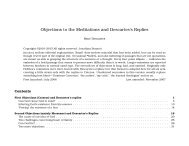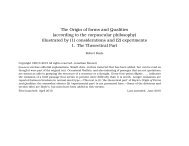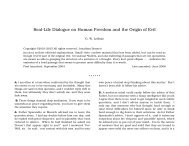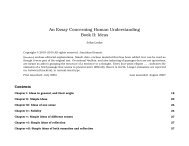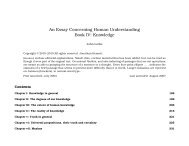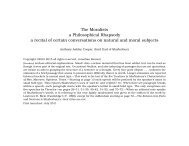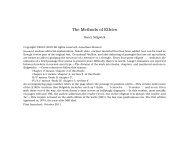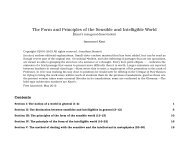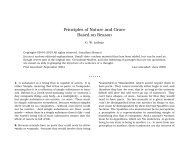A Vindication of the Rights of Woman with - Early Modern Texts
A Vindication of the Rights of Woman with - Early Modern Texts
A Vindication of the Rights of Woman with - Early Modern Texts
You also want an ePaper? Increase the reach of your titles
YUMPU automatically turns print PDFs into web optimized ePapers that Google loves.
The <strong>Rights</strong> <strong>of</strong> <strong>Woman</strong> Mary Wollstonecraft 2: Current views about sexual differences<br />
If <strong>the</strong>n women are not a swarm <strong>of</strong> insignificant ephemera<br />
[inserts like mayflies, that live for only one day], why should <strong>the</strong>y<br />
be kept in ignorance under <strong>the</strong> pretty label ‘innocence’?<br />
Men complain, <strong>with</strong> reason, about <strong>the</strong> follies and whims <strong>of</strong><br />
our sex, except when <strong>the</strong>y sharply satirize our headstrong<br />
passions and groveling vices. I would answer: Behold <strong>the</strong><br />
natural effect <strong>of</strong> ignorance! A mind that has only prejudices<br />
to rest on will always be unstable, and <strong>the</strong> current will run<br />
<strong>with</strong> destructive fury when <strong>the</strong>re are no barriers to break<br />
its force. Women are told from <strong>the</strong>ir infancy, and taught by<br />
<strong>the</strong>ir mo<strong>the</strong>rs’ example, that<br />
•a little knowledge <strong>of</strong> human weakness (properly called<br />
‘cunning’),<br />
•s<strong>of</strong>tness <strong>of</strong> temperament,<br />
•outward obedience, and<br />
•scrupulous attention to a puerile kind <strong>of</strong> propriety,<br />
will obtain for <strong>the</strong>m <strong>the</strong> protection <strong>of</strong> man; and if <strong>the</strong>y are<br />
also beautiful, that’s all <strong>the</strong>y need for at least twenty years.<br />
That is how Milton describes our first frail mo<strong>the</strong>r, ·Eve·;<br />
though when he tells us that women are formed for s<strong>of</strong>tness<br />
and sweet attractive grace I don’t understand him unless<br />
in true Moslem fashion he means to deprive us <strong>of</strong> souls,<br />
insinuating that all we were designed for was to use sweet<br />
attractive grace and docile blind obedience to gratify <strong>the</strong><br />
senses <strong>of</strong> man when he can no longer soar on <strong>the</strong> wing <strong>of</strong><br />
contemplation.<br />
Those who advise us only to turn ourselves into gentle<br />
domestic animals—how grossly <strong>the</strong>y insult us! For instance,<br />
<strong>the</strong> ‘winning s<strong>of</strong>tness’ that is so warmly and frequently<br />
recommended, that ‘governs by obeying’—what childish expressions!<br />
And a being who will sink to <strong>the</strong> level <strong>of</strong> governing<br />
by such underhand methods—what an insignificant being<br />
that must be! Can it be an immortal one? ‘Certainly,’ says<br />
Lord Bacon, ‘man is <strong>of</strong> kin to <strong>the</strong> beasts by his body: and<br />
13<br />
if he be not <strong>of</strong> kin to God by his spirit, he is a base and<br />
ignoble creature!’ Men, indeed, seem to me to act in a very<br />
unphilosophical manner when <strong>the</strong>y try to secure <strong>the</strong> good<br />
conduct <strong>of</strong> women by keeping <strong>the</strong>m always in a state <strong>of</strong><br />
childhood. Rousseau was more consistent when he wanted<br />
to stop <strong>the</strong> progress <strong>of</strong> reason in both sexes; for if men eat<br />
·fruit· <strong>of</strong> <strong>the</strong> tree <strong>of</strong> knowledge, women will come in for a taste,<br />
but <strong>the</strong> imperfect cultivation that <strong>the</strong>ir understandings now<br />
receive will give <strong>the</strong>m only a knowledge <strong>of</strong> evil.<br />
Children, I agree, should be innocent; but when ‘innocent’<br />
is applied to men or women it is merely a polite word<br />
for ‘weak’. If it is granted that women were destined by<br />
Providence [= ‘God’] to acquire human virtues, and to use<br />
<strong>the</strong>ir understandings to achieve <strong>the</strong> stability <strong>of</strong> character<br />
that is <strong>the</strong> firmest ground to rest our future hopes on, <strong>the</strong>n<br />
<strong>the</strong>y must be permitted to look to <strong>the</strong> fountain <strong>of</strong> light (·God·)<br />
and not forced to steeer by <strong>the</strong> twinkling <strong>of</strong> a mere satellite<br />
(·man·). Milton was <strong>of</strong> a very different opinion. . . ., but it<br />
would be hard to make consistent two passages that I am<br />
now going to contrast. But <strong>the</strong>n great men <strong>of</strong>ten led by <strong>the</strong>ir<br />
senses into such inconsistencies. [In <strong>the</strong>se lines Eve is speaking<br />
to Adam.]<br />
To whom thus Eve <strong>with</strong> perfect beauty adorned:<br />
My author and disposer, what thou bidst<br />
Unargued I obey; so God ordains,<br />
God is thy law, thou mine; to know no more<br />
Is woman’s happiest knowledge and her praise.<br />
These are exactly <strong>the</strong> arguments I have used to children!<br />
But <strong>the</strong>n I have added: ‘Your reason is now gaining strength.<br />
Until it arrives at some degree <strong>of</strong> maturity, you must look up<br />
to me for advice; but when it does arrive <strong>the</strong>re, you ought to<br />
think, and rely only on God.’<br />
Yet, in <strong>the</strong>se next lines, Milton seems to agree <strong>with</strong> me,<br />
when he makes Adam protest to his Maker like this:



